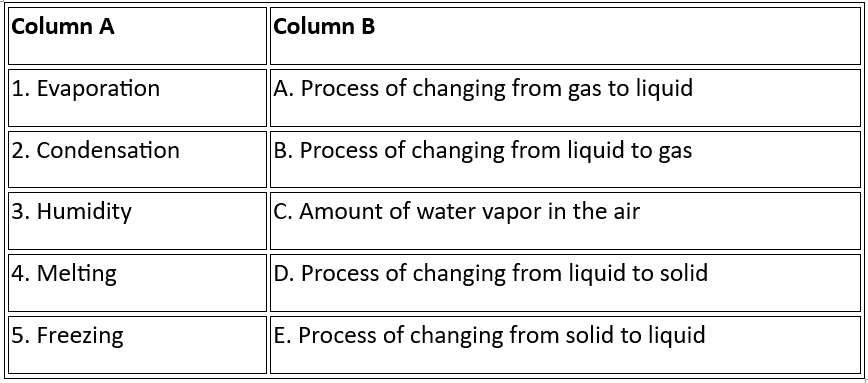Worksheet: A Journey through States of Water - 1 | Worksheets with Solutions for Class 6 PDF Download
| Table of contents |

|
| Multiple Choice Questions (MCQs) |

|
| Fill in the Blanks |

|
| True or False |

|
| Match the Following |

|
Multiple Choice Questions (MCQs)
Q1: What is the process of water turning into vapour called?
(a) Condensation
(b) Evaporation
(c) Freezing
(d) Melting
Q2: Which state of water does not have a fixed shape?
(a) Ice
(b) Water
(c) Water vapour
(d) Both b and c
Q3: What happens to water vapour when it cools down?
(a) It disappears
(b) It condenses into a liquid
(c) It becomes ice
(d) It evaporates
Q4: Which of the following factors does NOT affect the rate of evaporation?
(a) Temperature
(b) Humidity
(c) Altitude
(d) Surface area
Q5: What device collects moisture from humid air to produce drinkable water?
(a) Dehumidifier
(b) Atmospheric Water Generator
(c) Air conditioner
(d) Evaporator
Fill in the Blanks
Q1: The process of changing from a solid to a liquid is called __________.
Q2: Water vapor is __________ when it cools to form water droplets.
Q3: __________ refers to the amount of water vapor present in the air.
Q4: Ice is the __________ state of water.
Q5: Evaporation occurs faster at __________ temperatures.
True or False
Q1: Ice and water are the same substance in different states.
Q2: Water vapour is visible in the air.
Q3: Water can change states by adding or removing heat.
Q4: Higher humidity results in drier air.
Q5: Evaporation has a cooling effect on the surroundings.
Match the Following

You can access the solutions to this worksheet here.
FAQs on Worksheet: A Journey through States of Water - 1 - Worksheets with Solutions for Class 6
| 1. What are the three main states of water? |  |
| 2. How does water change from one state to another? |  |
| 3. What is the significance of the water cycle? |  |
| 4. How does temperature affect the state of water? |  |
| 5. Can water exist in more than one state at the same time? |  |
















